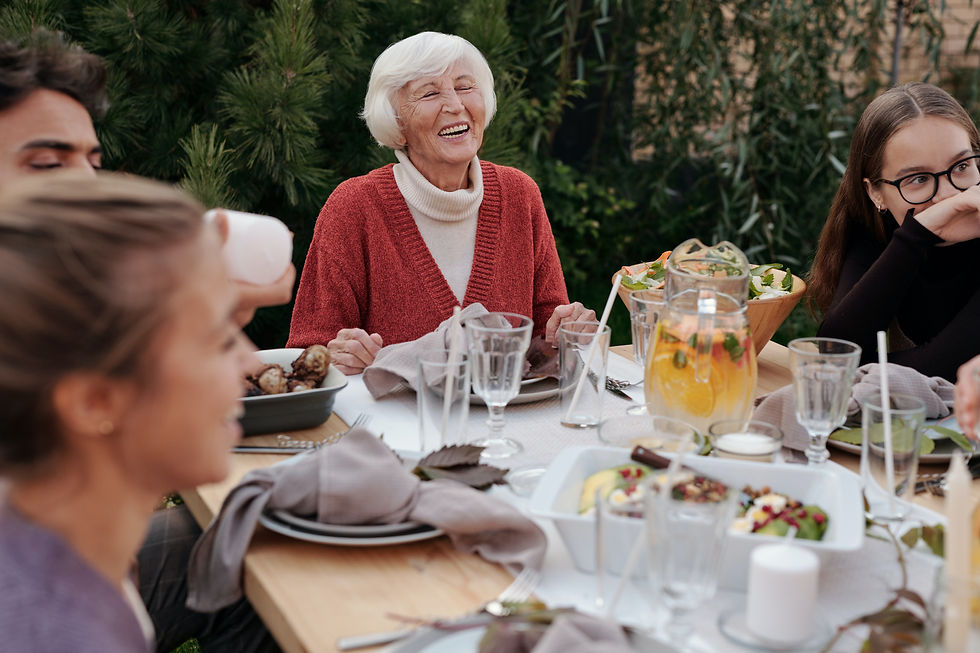Meeting the Family: Interracial Couple Edition
- Raina LaGrand

- Feb 14, 2023
- 3 min read

Meeting the family is almost always a little nerve-wracking. You want to make a good impression!
While you may have an *idea* of how things will go, you can never be 100% sure that things will go smoothly. And when you layer on racial differences on top of that, it can make for an awkward or tense initial interaction.
These are my top six tips for meeting the family when you’re in an interracial relationship.
Ask if there are any things you should be aware of.
Does Grandma need you to speak up a little bit louder than normal? Do you need to take your shoes off when you enter your “in-laws” home? Are you allowed to say you know that cousin Sue is currently struggling with her mental health?
Checking in like this is part of a larger relationship practice in communication and team work. Consider this practice your “pre-briefing” and try it out before other events as well.
Discuss what you’ll each need to feel relaxed and present.

Continuing on from the tip above, check in about how you can support each other in feeling comfortable. Do you need a bat signal in case of emergency?
Consider that you might not always be able to be together for the whole event. You might get pulled into different conversations. Depending on your level of anxiety, acknowledging this and planning for it can prevent hurt feelings, such as one partner feeling the other is ignoring or abandoning them.
Don’t pretend to know things you don’t actually know about.
Don’t pretend to know a historical figure’s name or story just because everyone else is talking about them. Don’t pretend to know religious traditions you don’t actually know about. Don’t pretend to know more about the occupation of Palestine than you do. Defer to your partner’s family’s cultural expertise and do your own learning.
Be respectful and gracious.
Different cultures have different labels for elders or don’t eat certain things. They might expect you to cover your hair or not wear a crop top. Try to keep these things in mind even if they are vastly different from your experience.
You’re welcome to share about your culture, too! Remember that you can share without projecting your lived experience or your idea of what’s “right” onto others.
Don’t take bullshit.
Look, race can bring up big feelings; shame, guilt, anger, rage, judgment. If you’re getting picked on and it feels like it’s about race or something, firmly and calmly stand up for yourself or excuse yourself. Try not to react in the moment. You can always state your case later after you’ve calmed down and gathered your thoughts.
My fingers are crossed that your partner will also be able to navigate this kind of passive aggressiveness. This is especially important for partners with more racial privilege to keep in mind. Part of creating safety in your relationship is engaging with racism and microaggressions.
Check in after the event.
This is your “post-briefing.” How did things go? Celebrate the successes! Bask in the joy and fun! Make a plan to address things that didn’t feel so great. You might even plan proactively to have a date or quality time immediately following the event.
The Conflict & Connection E-Guide for Couples

My free Conflict and Connection E-Guide for Couples is full of information and exercises to help you navigate tough situations and conversations. You can download yours and use the resources provided to support your relationship in situations ranging from meeting to the family, to dealing with interpersonal conflict, to supporting one another in grief, anxiety, and more.
Need more support?
I specialize in therapy related to racial identity issues. I help my clients resolve insecurities and build relationships from a confident, authentic and embodied place. If you and your partner want more focused support schedule your complimentary consultation now.
Photos by Askar Abayev, fauxels, and Giorgio Trovata




Comments